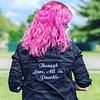Take a photo of a barcode or cover
This novel in verse brings the Salem Witch Trials to life through the eyes of three of the afflicted girls. There's little miss queen bee Ann Putnam, the beautiful orphan Mercy Lewis, and Margaret Walcott who pines after Isaac Farrar. With its subject matter and verse format, this fictionalized account has a lot of teen appeal. An author's note is included (yay!). The novel's told from three perspectives and I had trouble telling each voice apart. Also, I'm not an expert, but I may have caught a historical inaccuracy - bloomers are referred to more than once throughout the book, but "bloomers" did not exist (at least they weren't called such) until the 1850s, I believe. Not a huge deal, maybe, but where there's one there could be more...
More on the blog: http://www.abbythelibrarian.com/2010/09/wicked-girls.html
More on the blog: http://www.abbythelibrarian.com/2010/09/wicked-girls.html
This is a mixed review- 4 stars for the story itself, but 1 star for the method, the "novel in verse." It particularly didn't work well for this novel since there was a great amount of dialogue and it ended up being choppy and hard to follow. Also, it was hard to keep track of whose point of view you were reading since the author switched between three different narrators. That being said, I thought the story itself was great! For a historical novel, there was a lot of issues that teens today could relate to, like peer pressure and struggling to find one's place in society.
dark
emotional
informative
mysterious
sad
tense
medium-paced
Plot or Character Driven:
Plot
Strong character development:
Yes
Loveable characters:
Complicated
Diverse cast of characters:
No
Flaws of characters a main focus:
Yes
I couldn't distinguish among the voices and was bored because of it. I give up. I didn't think it worked well as a verse novel in multiple voices; had it been through one voice in verse, it would have been stronger, I think. I'd be more compelled.
This was very odd. Like a Mean Girls version of the Salem Witch Trials told in verse.
I find it very interesting that each girl was based upon a real girl. Based on girls who accused people of being witches. Who were responsible for almost twenty hangings. That's pretty scary
Wicked Girls is a fictionalized account of the “afflicted” girls who were responsible for the Salem Witch Trials. The point of view of this novel in verse alternates between Ann Putnam, Jr. a twelve year old girl who has high social standing in Salem Village, seventeen year old Mercy Lewis who is an orphan and a servant in the Putnam household, and seventeen year old Margaret Walcott who is Ann’s cousin but of a lower social status than Ann. The book follows the girls from the beginnings of the witch hunt, through the trials that followed, and finally into obscurity after the trials came to an end.
Much has been written, both fiction and nonfiction, about the Salem Witch Trials; however, Stephanie Hemphill’s approach to this familiar story is unique bringing into focus the girls who were responsible for creating the hysteria. Ann, Mercy and Margaret come from very different family situations and social classes, but all three share the same feelings of powerlessness and insignificance in the male dominated culture of Salem. Through their “afflictions,” they gain a level of power and fame that becomes addictive. The girls can’t seem to stop themselves – even when the first of the accused is tried and hanged. The characters seem two-dimensional in the beginning; however, Hemphill skillfully develops each of them throughout the book adding layer upon layer until they seem to be very real people. Though the setting of the book is very important, the themes of peer pressure and power amongst teen age girls are truly timeless. Wicked Girls will be a hit with fans of historical fiction, but this is also a book for any girl who has felt like she was part of the crowd one minute and an outcast the next.
Much has been written, both fiction and nonfiction, about the Salem Witch Trials; however, Stephanie Hemphill’s approach to this familiar story is unique bringing into focus the girls who were responsible for creating the hysteria. Ann, Mercy and Margaret come from very different family situations and social classes, but all three share the same feelings of powerlessness and insignificance in the male dominated culture of Salem. Through their “afflictions,” they gain a level of power and fame that becomes addictive. The girls can’t seem to stop themselves – even when the first of the accused is tried and hanged. The characters seem two-dimensional in the beginning; however, Hemphill skillfully develops each of them throughout the book adding layer upon layer until they seem to be very real people. Though the setting of the book is very important, the themes of peer pressure and power amongst teen age girls are truly timeless. Wicked Girls will be a hit with fans of historical fiction, but this is also a book for any girl who has felt like she was part of the crowd one minute and an outcast the next.
Love the whole Salem Witch hunt story but really struggled to get through this book.
Getting right to the point: the structure of the book was VERY WEIRD. It was structured into poems... but the thing was that it wasn't poems. At times, I felt like the book was mocking the tragedy of the Salem Witch Trials. There was not a sign of character development in any of the girls. I wouldn't recommend this book to anyone.






